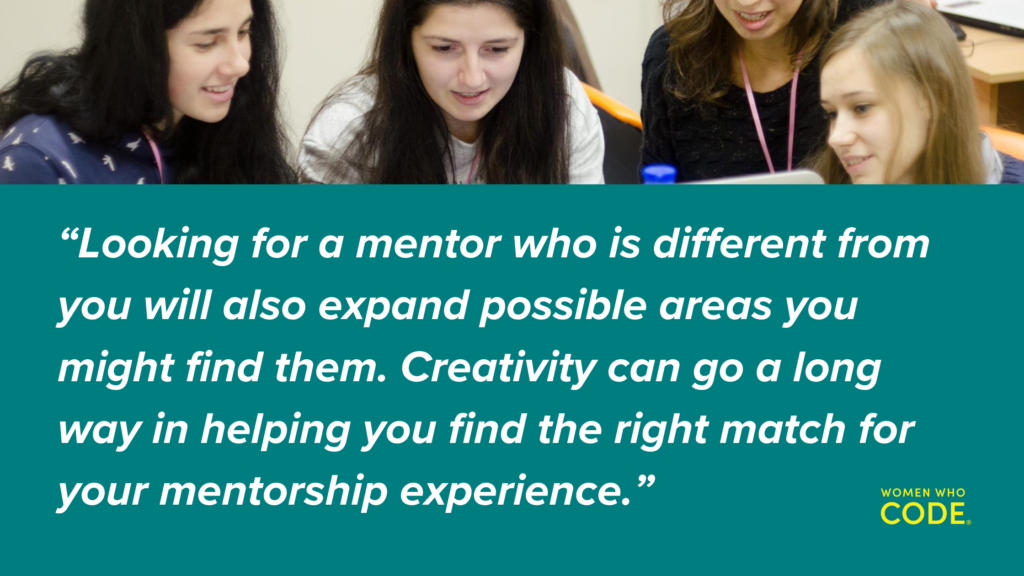Thriving Through Mentorship: How to Find the Right Mentor
Written by Manda Frederick

Navigating a tech career involves continuous learning and growth, which can be both exciting and challenging. While you should draw support from groups like WWCode Slack, WWCode Technical Tracks, and WWCode Networks, it may be time to find a 1:1 mentor if you need or want more individualized support. If you feel your career growth has been slow, and you’ve outlined professional goals you could use guidance in achieving, consider seeking a mentor to help you to the next level.
A mentor can offer practical insights and strategic thinking gained from first-hand experience. Whether building confidence, navigating corporate culture, or planning your career trajectory, a mentor provides supportive guidance for short- and long-term goals.
Once you’ve decided you are ready, the next action is to find and secure a mentor—but how? This article will answer common questions about finding and retaining a mentor so that you can benefit from 1:1 support as you level up in your career.
Finding the Right Mentor
Consider seeking a mentor who shares some of your values and goals but who also offers a diverse perspective (e.g., backgrounds, industries). It’s important that your mentor will know how to guide you professionally but that they will also enrich your growth with fresh ideas. Looking for a mentor who is different from you will also expand the areas in which you might find them. Creativity can go a long way in helping you find the right match for your mentorship experience.
How can I find a mentor?
Consider connecting with individuals in the following spaces:
- WWCode Networks and Digital Communities: Let your WWCode Technical Track or WWCode Network know that you are looking for a mentor.
- Professional Networking Events and Platforms: Attend industry events (e.g., seminars, Meetups, conferences) to network with experienced professionals. Through platforms like LinkedIn, find other professionals, join relevant groups, and express your interest in finding a mentor in your profile.
- Alumni Networks: Many universities, boot camps, and colleges have mentorship programs or can connect you with alumni who are willing to mentor.
- Online Mentorship Platforms: Explore online mentorship platforms such as Mentoring Her, SCORE, MicroMentor, Mentor Cruise, or LinkedIn’s Career Advice.
- Industry Associations and Professional Societies: Many of these groups have mentorship programs or can help you connect with experienced professionals in your field.
- Company Mentorship Programs: Inquire about mentorship programs within your workplace that help employees grow and advance in their careers.
- Volunteer Work: Get involved in volunteer activities related to your interests to meet experienced individuals who are passionate about mentoring others.

How can I ask someone to be my mentor?
After identifying someone whose experience, skill, or values align with your goals, use these tips for making the request:
- Build a Relationship First: Building a relationship with the person before formally asking them to be your mentor is often beneficial. Attend events they participate in, engage with them on professional platforms, and express genuine interest in their work.
- Be Clear and Specific About Your Goals: Clearly state that you are seeking mentorship, and articulate your career or personal development goals and how this person could specifically help your growth.
- Express Your Appreciation: Express your admiration for the person’s work or achievements. Tell them why you value their expertise and believe they would be an excellent mentor.
- Acknowledge Their Time Commitment: Recognize that mentorship requires time and effort. Assure them that you respect their time and are willing to work around their schedule.
- Propose a Structure: If you have an idea of how often you’d like to meet or the format of your mentorship (e.g., in-person meetings, virtual check-ins, email correspondence), propose it.
- Show Initiative: Demonstrate your commitment to the mentorship by outlining what steps you’ve already taken to work toward your goals. This could include courses you’ve taken, projects you’ve completed, or other proactive measures.
Here is a sample letter you can use to contact a potential mentor:
Hello, [Mentor’s Name],
I hope this message finds you well. I’ve been following your work for some time, and I’m inspired by [specific aspect of their work]. Your experience in [industry/field] is something I admire.
I am working towards [your specific goals], and I believe your insights and guidance will be invaluable to my journey. I understand that mentorship requires time and commitment, and I want to assure you that I respect your schedule. I am open to a structure that works best for you and committed to maximizing this opportunity.
Would you be open to discussing the possibility of a mentorship? I would be grateful for the opportunity to learn from your experiences and insights.
Thank you for considering my request. I appreciate your time.
Best regards,
[Your Name]
You can anticipate some back-and-forth communication as you clarify your goals, align on how this person can support you, and agree upon a format and schedule for your interactions. The key is to be respectful and intentional. Contacting the right person to support you personally and professionally is important to ensure a fulfilling and helpful relationship that rewards both people as you work toward helping you thrive in your tech career.